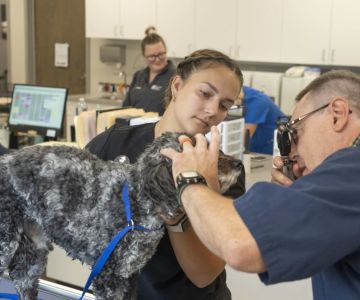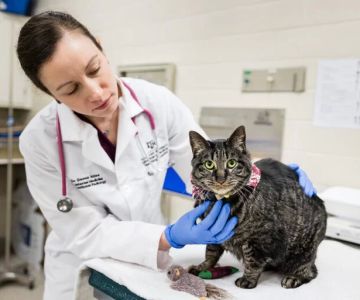Is Veterinary Care Tax Deductible? A Comprehensive Guide for Pet Owners
As a pet owner, you may have wondered whether the expenses associated with your pet's healthcare could be tax-deductible. The costs of veterinary care can add up quickly, and any potential tax relief could be a welcome benefit. In this article, we will explore whether veterinary care is tax deductible, what qualifies for a deduction, and how you can navigate this area of tax law to make sure you’re maximizing your tax benefits for your furry companions.
1. Understanding Tax Deductions and Veterinary Care
In general, the IRS allows individuals to deduct certain medical expenses from their taxable income, but when it comes to pets, the rules are a bit more complicated. Veterinary expenses are typically not considered deductible unless they fall under specific circumstances. The IRS classifies veterinary care as an ordinary expense unless the pet is a service animal or plays a crucial role in your medical care.
Let’s delve into the specifics of how these rules apply to veterinary care and whether you can deduct your pet’s medical costs from your taxes.
2. When Can You Deduct Veterinary Care for Pets?
While the general rule is that you cannot deduct ordinary pet care expenses, there are exceptions. Here are the circumstances under which you might be able to deduct veterinary costs:
Service Animals
If your pet is classified as a service animal and is required for medical reasons, such as a guide dog for a visually impaired person, the costs associated with their care can be tax-deductible. This includes veterinary bills, grooming, and other related expenses. In this case, the pet is considered a necessary medical tool, and the IRS allows deductions under the medical expenses category.
Pet Expenses for a Business
If you use your pet for business purposes, such as a guard dog or working animal on a farm, then certain costs related to the care of the animal may be deductible as a business expense. This includes veterinary care, food, and boarding costs when directly related to the business use of the animal. You would need to document the expenses and demonstrate the pet’s role in the business operation to qualify for the deduction.
Medical Treatment for Pets
If your pet has been injured or becomes ill and requires veterinary treatment that is essential for their health or your well-being, some of these costs might be deductible if the animal is used for medical purposes. This could apply to therapy animals that provide emotional support to their owners, where some costs could be considered part of your medical expenses.
3. What Expenses Are Typically Not Deductible?
While there are a few cases where you can deduct veterinary expenses, many pet-related costs are not deductible. Here are some common expenses that do not qualify for tax deductions:
Routine Veterinary Care
Routine care, such as annual check-ups, vaccinations, and preventive treatments, is generally considered an ordinary expense and not deductible. These are typical costs for keeping your pet healthy but are not connected to medical or business use that would qualify for a deduction.
Pet Food and Supplies
Pet food, grooming, and other general pet supplies are also not deductible, even if you are spending a significant amount on these items. Unless they are specifically tied to a medical need (such as a special diet prescribed by a veterinarian), these costs are considered personal expenses and do not qualify for tax relief.
Pet Boarding and Travel
Expenses related to pet boarding or travel costs are also not deductible. However, if you are traveling for business purposes and need to bring your pet along as part of your business, some related expenses might be deductible, but this would not apply to typical vacations or personal travel.
4. How to Keep Track of Veterinary Expenses for Tax Purposes
If you believe you qualify for a deduction on your veterinary expenses, it's important to keep thorough and accurate records. This includes receipts for all veterinary visits, medications, treatments, and any other expenses related to your pet’s care. If your pet is considered a service animal or has a medical purpose, document your pet’s role and the necessity of the treatments or services provided.
For pets used in business, maintain a clear log of the animal's activities, including any direct business-related care expenses. If the IRS audits your tax return, having detailed records will make the process easier and improve your chances of successfully claiming the deduction.
5. Consult a Tax Professional for Guidance
Tax laws can be complex, and the rules surrounding deductions for pets are no exception. If you're unsure whether you qualify for a deduction on veterinary expenses, it's a good idea to consult with a tax professional who can guide you through the process. A tax professional can help you determine whether you meet the criteria for a deduction and assist you with filing your taxes accurately.
Conclusion: Maximizing Your Pet’s Tax Benefits
While veterinary care is not usually tax-deductible, there are situations where you may qualify for tax relief. If your pet is a service animal, used for business, or plays a critical medical role in your life, you may be eligible to deduct certain veterinary expenses. Always keep detailed records of your pet’s care, and consider consulting a tax professional to ensure that you are making the most of the tax benefits available to you.
By understanding the tax rules surrounding veterinary care and being proactive with your pet’s health expenses, you can ensure that you're maximizing any potential tax benefits. For further assistance with pet care or to find the best veterinary services for your pet, visit Hidden Brook Veterinary for expert guidance.
<> SEO Title: Can Veterinary Care Be Tax Deductible? A Guide for Pet Owners SEO Keywords: veterinary care tax deductible, pet care tax deduction, service animal tax deductions, pet health care deductions, tax deductions for pets SEO Description: Learn how to determine if your pet’s veterinary expenses can be tax-deductible. This guide explores the rules, exceptions, and tips for tax relief on pet care.










